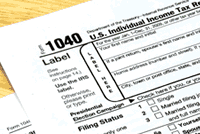Final and Estate Tax Returns
Typically, two returns need to be filed after a person dies; a final return and an estate return, but not always. In some instances, there is only the final return. In all cases, we need a copy of the death certificate.
If there’s no probate, the person in charge just needs to tell us what their relationship is to the deceased person.
An estate return is necessary when probate (court) is involved.
If it’s a probate/court situation, a federal ID needs to be secured for the estate. Someone will be appointed to oversee the estate return. The person in charge of the return could have one of three titles; executor, administrator or personal rep. That person should bring in the legal document stating they are in charge.
The responsibility of the person in charge is two-fold:
- 1) They agree, legally, to first file and pay all taxes, along with other bills in a timely fashion if the estate has the money. If the estate has no money, a return is filed showing the taxpayer as deceased. No money can be collected from a dead person.
- 2) They agree to find all assets and beneficiaries and distribute said assets to beneficiaries.
FINAL RETURN: This covers the year in which the person passed. It covers from January 1st through the date of death. Items to bring would include income sources, interest paid on a mortgage (if they had one), and a property tax statement, if applicable. Basically, the usual deductions of a standard tax return.
ESTATE RETURN: This return covers from the date of death to 11 months past the date of death. It’s necessary if anything was sold or earned after death. A federal ID number is needed for an estate return!
(Mohs can help with that)
The administrator should open a bank account for the estate. They should bring the bank information including routing and account number. Also include any income into the bank account and expenses out of the account. Expenses should be organized by categories including regular bills paid, medical, funeral expenses and lawyers’ fees. The administrator should also bring with them the names, addresses and social security numbers of all beneficiaries and the percentage of share of their inherited distribution.


